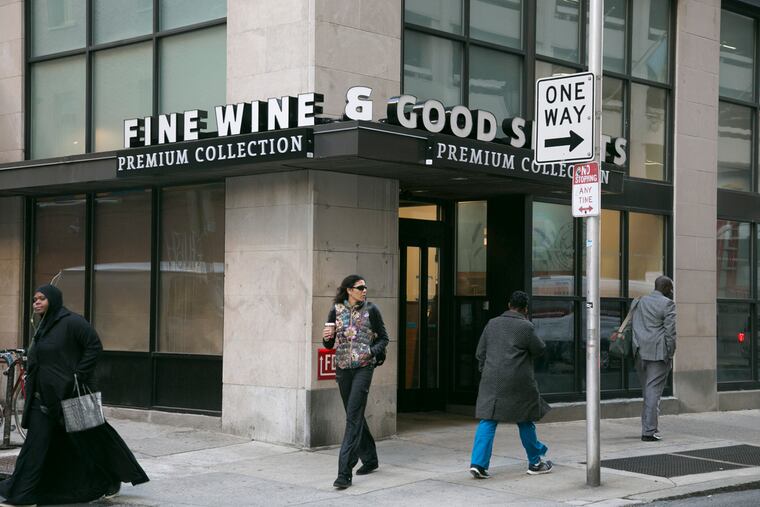Pa.'s answer to privatizing booze sales? Bigger, better state stores
WESTMONT, Pa. - Andy Rose wasn't thinking about the booze tax levied eight decades ago to help this region recover from a devastating flood, or the politics of the Liquor Control Board that controls alcohol sales in Pennsylvania.

WESTMONT, Pa. - Andy Rose wasn't thinking about the booze tax levied eight decades ago to help this region recover from a devastating flood, or the politics of the Liquor Control Board that controls alcohol sales in Pennsylvania.
He just wanted some wine.
So he came last week to the new state-run wine and spirits store that opened in this Johnstown suburb before Thanksgiving.
A law enacted this year lets Pennsylvanians for the first time buy wine at hundreds of grocery stores and gas stations, and online. Republican leaders who control the legislature insist total privatization remains their goal.
Yet here was Rose, browsing in one of dozens of State Stores opened or upgraded this year. Bigger and nicer than the one it replaced. And an example of how the LCB, created in the 1930s to regulate alcohol, has responded to the intensifying calls for its disbandment.
Rose, a 52-year-old engineering professor at the University of Pittsburgh at Johnstown, said he agrees with privatization. But if the LCB is here to stay, he said, "I'd rather have a new store."
The board has been pushing a new-store strategy since 2010, when it launched a "branding effort" to upgrade the appearance, size, and locations of its retail outlets, or open new ones. The LCB did so as soon-to-be Gov. Tom Corbett campaigned on a promise to privatize alcohol sales.
"This calendar year, we're going to complete 48 branding actions, which is the highest we've got done in one year since we started," Charlie Mooney, LCB executive director, said. "Our goal next year is to surpass 50 or 55."
Twelve months ago, the LCB had 600 stores. By year's end, it will have 610. In the next five years, that number could be as high as 630.
Two are coming to the Philadelphia area before Christmas: one with a grand opening Tuesday on Edgmont Avenue in Brookhaven, Delaware County, and a second at 1515 Locust St., near Rittenhouse Square, on Dec. 15.
The LCB says this is all consistent with the June law enacted by Gov. Wolf and the legislature - even though it diluted the LCB's monopoly by expanding wine sales to private outlets.
Restaurants, hotels, and hundreds of grocery and convenience stores may sell up to four bottles of wine to go, assuming they acquire the needed credentials from the state. About 140 grocery stores were already selling wine when the law was passed.
That could rise to 600 within a year, said LCB spokeswoman Elizabeth Brassell. The new law allows the LCB to open more stores - and with extended Sunday and holiday hours. It also allows for lottery machines to be installed.
"One of the major objectives ... was to produce more revenue for the Commonwealth of Pennsylvania," Brassell said. The new stores will do that.
When the law was approved this summer, House Minority Leader Frank Dermody (D., Allegheny) praised it as saving State Store jobs and "dramatically" improving consumer convenience.
Still, GOP leaders are convinced it will ultimately weaken the LCB. House Speaker Mike Turzai (R., Allegheny), most vocal about dissolving the board, predicted in June that the changes would "accelerate public demand for full privatization."
Two weeks ago, Turzai hinted that the privatization war may intensify yet again. He said privatizing the LCB's wholesale operations was being considered as a potential new revenue source: "It's one of the ideas on the table."
For all its potential weakening of the LCB, the law did reinforce the LCB's exclusive right to hard-liquor sales. That could help sustain the store-expansion strategy.
In an LCB study of 22 markets where refurbished or new stores opened, sales increased 5.5 percent, Brassell said. That study was done before this year's law was enacted.
How much does all this cost? Officials say they are negotiating hard when a lease expires - all stores are leased - and wresting from landlords a commitment to pay for renovations or construction at new sites. Costs are amortized into each lease, Brassell said, though no annual dollar figure was offered.
The new stores represent a leap for an agency long entrenched in inertia. Before 1969, the LCB did not have a single self-service store, Mooney noted.
The new sites are nearly twice as large as older ones, which ran about 3,000 square feet. Some Premium Collection stores are 14,000 square feet.
The LCB examines each store's operations when a lease expires before deciding whether to upgrade or relocate.
The Westmont store was in bad shape physically, but was doing well with customers.
"The store was actually growing in business. And we required more square footage," Mooney said. "So we actually relocated this store about a block."
Johnstown physician Brian Gunnlaugson, 61, welcomed the upgrade as he filled a basket with wine. But he said he was "torn" about the state-regulated system.
A native of Canada and a Johnstown resident for two decades, he has hoped for less restrictive wine and beer sales in Pennsylvania. But he said he can't diminish the progress made by the LCB.
"I kind of like what we have," Gunnlaugson said. "I've got no real problem with it."
610-313-8117@Panaritism